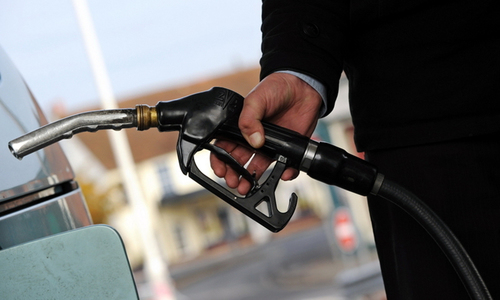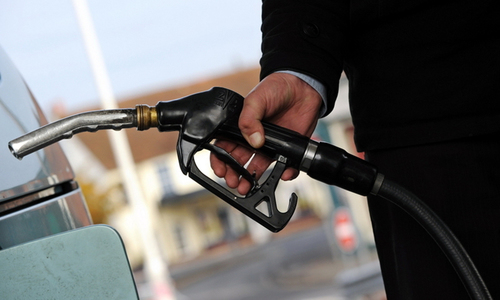ISLAMABAD: Hinting at a significant increase in levy on petroleum products next fiscal, Finance Minister Shaukat Tarin on Saturday said an understanding had been reached with Saudi Arabia for revival of its oil facility on deferred payments
“We will have to increase petroleum levy, take it up to Rs20 per litre,” he said while speaking at his post-budget news conference but hastened to add that the government would wait because of expectations about lifting of US sanctions against Iran and resultant drop in international prices that would be retained.
At present, there is Rs4 to Rs5 per litre levy on petrol and diesel.
The minister said the government might have to increase levy on petroleum products to achieve its petroleum levy target of Rs610 billion next year but hoped this would not be inflationary in view of expected lifting of US sanctions against Iran and its oil production and resultant lower international oil prices. In that case, the government will have the chance to mop up the levy by retaining the impact of decline in international oil price.
Says budget proposal for imposing duties on telecommunication services has been withdrawn
Moreover, Mr Tarin said, Pakistan and Saudi Arabia had reached an understanding on revival of Saudi oil facility on deferred payments, although the quantum of oil imports and terms of arrangement were yet to be decided.
Saudi Arabia had provided $3bn in cash deposits and promised a $3bn oil facility to Pakistan to help shore up its foreign exchange reserves in 2018. However, the arrangement fell through as bilateral relations deteriorated and Islamabad had to return $2bn out of $3bn deposits.
The minister said Pakistan did not exit the IMF programme as discussions were continuing and even if the sixth review was not completed in July, they would try to complete the next review in September because both sides agreed on the same destiny of sustainable growth and stability in power sector finances. To this, “they (IMF) want 40-45 per cent increase in power tariff and 100pc increase in personal income tax. This is regressive. We want to be progressive,” he said.
The issue was surplus capacity leading to capacity payments which the government would address by enhancing capacity utilisation of power sector, reducing losses and improving recoveries and in the meanwhile meeting financing gap through the budget for which sufficient allocations had been made for subsidy, he said.
On the issue of income taxes, he said again the government did not want to further burden the existing taxpayers and instead wanted to broaden the tax base through digitization.
The finance minister said he challenged critics who said the revenue plan was risky (to prove their assertions). “We are realistically aggressive,” he said, adding that about 13pc increase in revenue would flow only because of inflation and economic growth, leaving behind a Rs500bn gap, about Rs264bn of which would come through policy actions and remaining Rs246bn through administrative and innovative means with use of technology.
He said some people also challenged additional revenue through administrative means but forgot that Rs160bn revenue had been added this year through use of technology at about 10,000 points of sale (POS) while businesses remained subdued due to Covid-19. “Next year, we will take the number of these POS to at least 60,000 and give a Rs100 million prize and take this to Rs1bn per month so that customers demand computerised bills.”
Using this model 20 years ago, he had increased Habib Bank Limited’s deposits from a few million per month to Rs40bn, Mr Tarin said, adding that Turkey had also successfully used the same model.
The minister agreed the budget measures focused on trickle down and bottom up effects to support manufacturing and export sectors and simultaneously help 4-6 million vulnerable people and was left with limited space for lower middle class and middle class.
He also agreed that share of indirect taxes had gone up as compared to direct taxes in next year but argued that initial push to revenue increase had to come from indirect taxes as had happened in other developing countries before graduating to next level as had been done in Turkey and China.
The finance minister said the budget proposal for imposing duties on telecommunication services – Rs5 per GB on internet, 10 paisa per SMS and Re1 on mobile call above three minutes – had been withdrawn after opposition by the prime minister and the cabinet.
He said the main thrust of the budget was inclusive growth to uplift the poor and low-income people who remained deprived of houses, health facilities and business opportunities over the past 74 years. “Almighty Allah has given us the opportunity and the vision that we, for the first time in country’s history, are now directly targeting the poorest of the poor,” he said.
Published in Dawn, June 13th, 2021














































